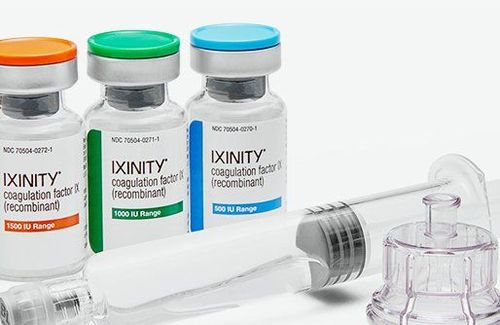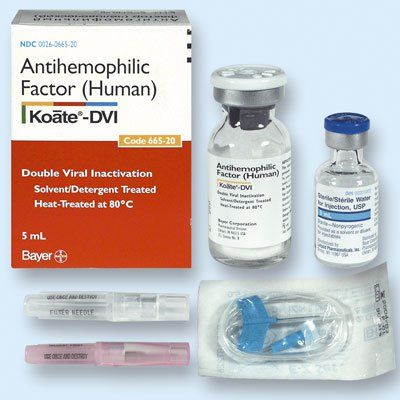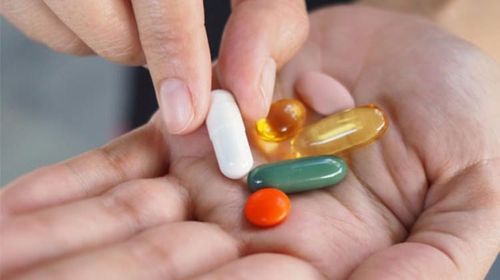This is an automatically translated article.
Alprolix Vial is an injection used to help control and prevent bleeding in people with hemophilia B or hemophilia. Hemophilia B is also known as congenital factor IX deficiency.
1. What is Alprolix vial?
Alprolix vial is used to prevent or control bleeding in people who do not have factor IX (due to hemophilia B, also known as Christmas disease). Factor IX is a protein (clotting factor) that works with other blood factors to help the blood clot. People with little or no factor IX are at increased risk of bleeding for longer after an injury, surgery, or sudden bleeding (in joints, muscles) with no known cause.This drug is not recommended in the treatment of other series of factor deficiencies (eg factor II, VII, VIII, X) or clotting factor problems (factor XIII inhibitors), to reverse for the effect of “blood thinners” (eg, warfarin), or to treat bleeding caused by low levels of liver-dependent clotting factors.
2. How is Alprolix vial used?
Read the instructions carefully before taking and consult your doctor, pharmacist when starting to use factor IX. This medication is given by injection into a vein over several minutes as directed by your doctor. Dosage is based on your medical condition (such as the amount and location of bleeding), your weight, and response to treatment.
If you are self-administering this medication at home, learn all directions for use from a healthcare professional. Before use, inspect this product with the naked eye for any unusual drug substance or discoloration. If so, do not use the vial. Learn how to safely store and dispose of medication packaging.
The medicine in the bottle and the items that come with the medicine should only be used once, not reused. For some brand-name drugs, it is important to limit the amount of blood entering the tube and to prevent blood from entering the syringe. You may need to use a new vial and a new set of supplies if this happens during the injection.

Thuốc Alprolix vial được sử dụng theo đường tiêm vào tĩnh mạch
3. Side effects of Alprolix vial
You may experience fever, pain at the injection site, chills, headache, flushing, weakness, nausea or vomiting. If any of these side effects persist or get worse, tell your doctor or pharmacist.
Remember that your doctor has prescribed this medicine because he or she has judged that the benefit outweighs the risk of adverse effects. See your doctor right away if you have any serious side effects, including: swelling at the injection site, trouble breathing, fast heartbeats, signs of kidney problems (such as change in the amount of urine), swollen ankles, feet, swelling, redness, pain in hands or feet, bleeding, bruising.
Get medical help right away if any of these rare but very serious side effects occur such as: bluish fingers, chest pain, trouble breathing.
Serious allergic reactions to this medicine are very rare. However, get medical help right away if you notice any symptoms of a serious allergic reaction, including: rash, itching, swelling (especially of the face, tongue, throat) , severe dizziness, trouble breathing.
4. Be careful when taking medicine
Before using factor IX, tell your doctor or pharmacist if you are allergic to factor IX products or if you have any other allergies to its ingredients. This product may contain inactive ingredients (such as latex), which may cause allergic reactions or other problems. Before using this medication, tell your doctor your medical history. , especially about: other clotting disorders (eg, disseminated intravascular coagulation), surgery, recently performed procedure, liver disease.
Before having any surgery, tell your doctor or dentist that you are using this medicine. For pregnant women, the drug should be used only when absolutely necessary. Thoroughly discuss the risks and benefits with your doctor. For women who are breast-feeding, there is currently no evidence that this medicine passes into breast milk, so consult your doctor if you take it.

Người bệnh cần trao đổi với bác sĩ ngay khi xuất hiện triệu chứng bất thường trong quá trình dùng thuốc
5. What drugs interact with Alprolix vial?
Drug interactions can change the way a drug works or increase the risk of serious side effects. Keep a list of all the products you use (including prescription, over-the-counter, and herbal products) and share it with your doctor or pharmacist. Do not start, stop, or change the dose of any medicine without your doctor's approval.
Some products that may interact with this drug include: drugs that help with blood clotting (such as aminocaproic acid, tranexamic acid).
6. Notes when using Alprolix vial
If you overdose and have serious symptoms while taking the medicine such as fainting or difficulty breathing, call 911 immediately.
Note that this medicine should not be mixed with other drugs. Tests (eg, factor IX activity) should be performed periodically to monitor disease progression or check for drug side effects. Consult your doctor for more details.
To achieve the best possible treatment, it is important that you take the medicine in the correct dose as directed. If you miss a dose, contact your doctor or pharmacist immediately to set up a new dosing schedule. Do not arbitrarily double the dose to make up for it.
Once you understand what Alprolix vial is and what disease does Alprolix vial treat? You can consult more experts about the use of drugs to bring the best effect and safety to the patient's health.
If you need more information about Alprolix vial, customers can go to Vinmec International General Hospital to have their health checked by doctors and give the most in-depth advice.
Please dial HOTLINE for more information or register for an appointment HERE. Download MyVinmec app to make appointments faster and to manage your bookings easily.
Reference source: webmd.com












